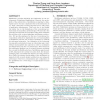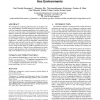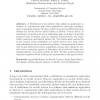153
click to vote
SEM
2004
Springer
15 years 7 months ago
2004
Springer
Abstract. Ubiquitous computing is a challenge for the design of middleware. The reasons are resource constraints, mobility, heterogeneity, etc., just to name a few. We argue that s...
127
Voted
OOPSLA
2004
Springer
15 years 7 months ago
2004
Springer
Middleware provides simplicity and uniformity for the development of distributed applications. However, the modularity of the architecture of middleware is starting to disintegrat...
129
click to vote
MIDDLEWARE
2004
Springer
15 years 7 months ago
2004
Springer
The miniaturization of hardware components has lead to the development of Wireless Sensor Networks (WSN) and networked-applications over them. Meanwhile, middleware systems have a...
128
Voted
MIDDLEWARE
2004
Springer
15 years 7 months ago
2004
Springer
Novel ubiquitous computing applications such as intelligent vehicles, smart buildings, and traffic management require special properties that traditional computing applications d...
120
click to vote
MIDDLEWARE
2004
Springer
15 years 7 months ago
2004
Springer
Middleware helps to manage the complexity and heterogeneity inherent in distributed systems. Traditional middleware has a monolithic architecture, which makes it difficult to adap...
122
click to vote
AP2PC
2004
Springer
15 years 7 months ago
2004
Springer
A Middleware is the software that assists an application to interact or communicate with other applications, networks, hardware, and/or operating systems. We have earlier proposed ...
126
click to vote
ADAEUROPE
2004
Springer
15 years 7 months ago
2004
Springer
Abstract. The development of real-time distributed applications requires middleware providing both reliability and performance. Middleware must be adaptable to meet application req...
125
click to vote
OTM
2005
Springer
15 years 7 months ago
2005
Springer
Abstract. Context-aware systems represent extremely complex and heterogeneous distributed systems, composed of sensors, actuators, application components, and a variety of context ...
122
click to vote
MIDDLEWARE
2005
Springer
15 years 7 months ago
2005
Springer
This paper presents a context-aware middleware for multimodal dialogue applications. The middleware has the context tracing feature, which is the possibility of the middleware to ...
144
click to vote
MIDDLEWARE
2005
Springer
15 years 7 months ago
2005
Springer
Pervasive and ad hoc computing applications are frequently deployed in dynamic networks. Due to mobility of the computing nodes, their unreliability, or a limited communication ra...







